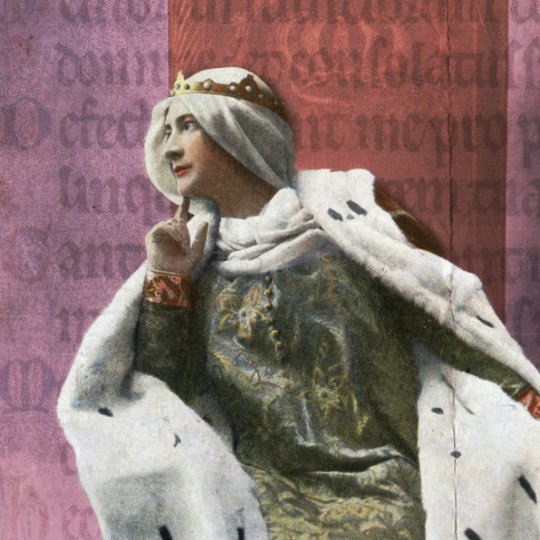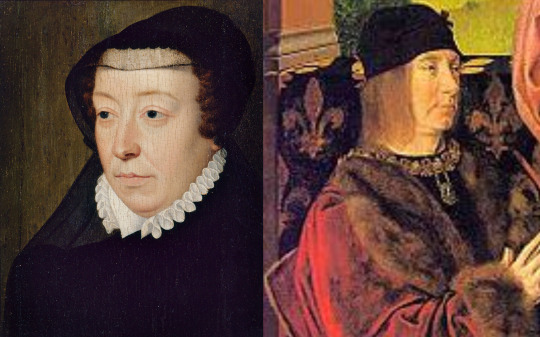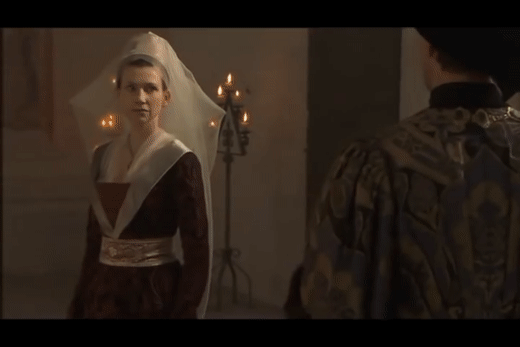#regents
Text
Regents are soon! Y'all ain't seeing me ever again based on my current grades in chemistry and geometry!
#high school#chemistry#geometry#regents#school#gonna have to cheer my entire friend group up after regents!#thats gonna be fun
6 notes
·
View notes
Text
6 notes
·
View notes
Text
Blanche and her image.

The image of Blanche in the hagiographies of her son is that of the mother of a saint. She is pious, severe, almost as austere as her son. Her wisdom, counsel, courage and political achievements are recognised, but not her vitality. But Blanche loved the things of this world too: music and song, rich colours in manuscripts, hunting, pomegranates, ginger and salmon, furs and silks and jewels. She loved and understood the workings of power. She loved the trappings of power, and knew how they should be used in the construction of a regal image. And she knew how important image was in the reality of power. Blanche has to be seen, not just as the mother of St Louis, but as the great-granddaughter of the empress Matilda, the granddaughter of Henry II and Eleanor of Aquitaine, the niece of Richard the Lionheart and the mother of Charles of Anjou. These were the rulers that she herself resembled. They, too, were profoundly pious, with a certain questioning intellectual seriousness. All were great founders and supporters of austerely reformist monasticism or religion. Inner conflict there must have been, but all were strong enough in personality to contain thar conflict. So Blanche ate her pomegranates, chose her jewelled gifts for friends and relations, listened to Melana and Passerele, laughed at the courtly romantic songs of Theobald of Champagne, discussed the new books from Toledo with the urbane Romanus, kept abreast of plots through her agents in La Rochelle and Carcassonne; but she prayed devoutly too, absorbing the meaning of the texts on the sacred pages of her psalters and bibles with her chaplains and religious advisers, planned her abbeys with meticulous care, built hospitals, released prisoners and scartered alms to the poor with lavish abandon. For she knew always that, at the End of Time, someone might point to her and say ‘Look — that was once the queen of France’.
Lindy Grant- Blanche of Castile, Queen of France
#xiii#lindy grant#blanche of castile queen of france#blanche de castille#house of ivrea#queens of france#regents
17 notes
·
View notes
Text
To the people who are still up studying for the Geometry Regent like I am (and for future people who might take it). Good luck guys and may the odds be ever in our favor
#geometry#geometry regents#school#regents#students#education#learning#student#tests#testing#2023 geometry regents
4 notes
·
View notes
Text
I’m convinced that the New York education system created the regents to torture children. They pulled that exam booklet from the depths of hell
27 notes
·
View notes
Text
so apparently I got mastery on two of the regents?? let's gooooooooo
3 notes
·
View notes
Text
I forgot my headphones at home I’m kinda panicking
4 notes
·
View notes
Text
manifesting i get at least a 66 on my geometry regents.
6 notes
·
View notes
Text
Gonna go take the English regents. Wish me luck
#regents#regents exam#regents exams#regents test#regents tests#test#tests#exam#exams#school#fuck school#wish me luck#English#English language arts#ela
6 notes
·
View notes
Video
Resting. Not sleeping. by John Wolfe
Via Flickr:
Tigers at London Zoo 2024
#lion#London Zoo#London#Zoo#ZSL#Tiger#Asim#Gaysha#Panthera#tigris#tigers#tigress#portrait#face#bokeh#Regents#park#animals#nature#Sumatran#Felidae#mammals#carnivores#Big#cats#Indonesian#animal#roar#regents park#flickr
0 notes
Text

Catherine de Médicis:
assured the regency for her husband Henri II when he left for war.
Pierre de Beaujeu/Pierre II de Bourbon:
was a co-regent with his wife until his brother-in-law Charles VIII was old enough to get the throne.
1 note
·
View note
Text
How do I remember ideal gases vs real gases? Simple.
Real gases are in relationships and are attracted to each other. Ideal gased are single and they're the main character i want so badly.
Real gases become more like ideal gases when they get into fights more often for no reason and are on the verge of breaking up (more fights cuz they have high temperatures, but there was no pressure to make them fight).
#chemistry#high school#regents#ideal gases#real gases#this is legit what i will be remembering#im not even joking#i told this to my chem friend and she said#dont make this a fanfic#so#now i have a mission.
4 notes
·
View notes
Text
Anne de Beaujeu
Anne de Beaujeu (Anne de France, 1461-1522)
Unofficial regent of France and duchess of Bourbon

Anne de Beaujeu provides an example of female political authority in a country where the Salic Law prevented women from assuming the crown. She also illustrates the tension between an increasingly centralized monarchy on the one hand and feudal independence on the other, having supported both causes at different times in her life. Probably born in 1461, Anne de Beaujeu was the oldest of the surviving children of Louis XI, king of France, and the one said to resemble him most intellectually and temperamentally. When this king died in 1483 leaving a thirteen-year-old Charles VIII on the throne, Anne and her husband, Pierre de Beaujeu, as his guardians, assumed control. In so doing, they resisted Louis d'Orléans, the next in line to the throne, who wished to be named regent. Louis and his supporters sought help from the estates-general who met in 1484 but who ultimately supported Anne's cause. Referred to as Madame la Grande (Grand Madam), Anne was recognized by the court and by foreign emissaries as the person actually ruling France during the early years of Charles's reign.
In 1488 she and Charles VIII squelched a noble uprising, the Guerre Folle (the Foolish War) led by Louis d'Orléans and Francis II duke of Brittany. Charles then married the new duchess of Brittany, Anne, to ensure the duchy's loyalty to France. Meanwhile Pierre de Beaujeu's two older brothers had died, leaving Pierre with the Bourbon inheritance. Anne and her husband were now the richest and most powerful nobles in France. In 1491, after the loss of one infant and fifteen years of childlessness, Anne gave birth to a daughter, Suzanne. As Charles VIII grew increasingly independent of his older sister, Anne redirected her attention to her own lands and feudal duties, though she remained his advisor while retaining her ties to the court. When Charles died suddenly in 1498 leaving no heirs, Louis d'Orléans became king of France. Neither his previous attacks on the crown nor his well-known personal vices inspired confidence in his subjects, so the support of Anne de Beaujeu and her husband were instrumental in a smooth accession to the throne. Anne agreed to overlook their antagonistic past and did not hinder the annulment Louis immediately requested from her physically disabled sister, Jeanne. In exchange, Louis XII waived the royal rights to the Bourbon inheritance in the case that Anne and Pierre did not have a male heir. Once all this had been established, the Bourbon's relationship with Louis XII and his new queen, Charles's widow Anne de Bretagne, became quite cordial. Anne de Beaujeu no longer held any direct influence, however, over the governance of the French state.
In 1504 or 1505, after the death of her husband and before she arranged a marriage for her daughter, Anne wrote Suzanne a book of lessons, Les Enseignements d'Anne de France, duchesse de Bourbonnois et d'Auvergne, à sa fille Susanne de Bourbon, modeled on the book that Louis IX had written for his daughter, the one her own father had written for Charles, and the writings of Christine de Pizan. Anne's version contains conventional advice on the appropriate behavior for noblewomen. During her unofficial regency, Anne had overseen the education of many young noblewomen at court, including Louise de Savoie, Marguerite d'Autriche, and Diane de Poitiers. The humble feminine figure that emerges from the Enseignements, however, seems at odds with their independent author. More easily recognizable are the anxieties about life as an older widow distant from court. The Enseignements ends with a tale about a noblewoman who bravely sacrifices her only child for the honor of her family and the interests of the king. Suzanne was, in fact, married shortly thereafter to a cousin to protect the integrity of the Bourbon inheritance.
In contrast to the moral of her tale, however, the interests of a noble family and those of the crown did not always overlap. Before she died, Anne witnessed the opposition of two adults whom she had raised from childhood: her son-in-law, the connétable de Bourbon, and Louise de Savoie, mother of Francis I, successor to Louis XII. Louise and her son, suspicious of the wealth and power of the connétable, the Bourbon heir, challenged his inheritance. After losing the domain that Anne had so carefully built up and defended during her lifetime, the connétable, perhaps with Anne's bitter approval, responded by betraying the French king Francis I- the other cause that Anne had defended so staunchly during her brother's reign. Anne died in 1522, before this ultimate betrayal.
Emily Thompson in Encyclopedia of Women in the Renaissance.
#xv#xvi#anne de france#anne de beaujeu#regents#duchesse de bourbon#louis xi#charles viii#pierre de beaujeu#louis xii#françois ii de bretagne#anne de bretagne#la guerre folle#suzanne de bourbon#sainte jeanne de france#louise de savoie#marguerite d'autriche#diane de poitiers#charles iii de bourbon#le connétable de bourbon#françois i#proof that anne approved of this ? i didn't find anything#the connétable's betrayal is a complex story#one can point fingers at françois i and louise de savoie too#emily thompson#encyclopedia of women in the renaissance
16 notes
·
View notes
Text
yeah facebook is terrible but sometimes you stumble across pure gold. there are dream animals i want to see in the wild and there will be posts like

ma'am that is the critically endangered regent honeyeater. There are less than 300 of them left in the wild
#the anklet indicates captive breed and released BUT STILL#i want to see one so bad this is so funny to me#birds#regent honeyeater#Anthochaera phrygia#bird#honeyeater#australian animals#fauna#conservation#wildlife
20K notes
·
View notes
Text
to my fellow students who sat living environment regents yesterday, algebra 1 regents today, or both.... i hope we did not fail
#regents#living environment#algebra 1#living environment regents#algebra 1 regents#finals#no but i legit think i passed they were so easy
3 notes
·
View notes
Text
it sucks ass but here’s my study quizlet in case someone else can find it useful
0 notes
